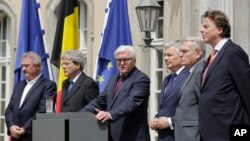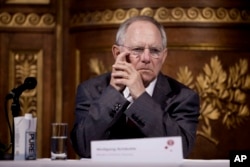“What the hell happens next?” Britain’s Daily Mirror questioned on its front page Saturday. The British tabloid newspaper isn’t the only one wondering about the next steps for Britain and for Europe. So, too, are the continent’s leaders, who are now falling out over what to do.
As the continent’s leaders grapple with the widening consequences of Thursday's Brexit referendum – a vote that has sent stock markets crashing, currencies plunging and political parties imploding – rancor is rising in London and other European capitals. Much of it is driven by alarm and resentment. Britain has taken a "swan dive" from a high cliff and grabbed Europe just before jumping, some EU officials argue.
Fear is spreading about whether other EU member countries may flee the bloc, and some EU leaders want to punish the British as an example to others who may be contemplating departure.
Fears abroad
More than 2 million Britons living in other EU countries are clamoring to know what will happen to them. Will they be allowed to stay or will they lose livelihoods and homes?
Uncertainty also haunts the more than 2 million EU citizens living in Britain.
Both groups of expatriates – ignored by the "remain" camp and not given a second thought by the "leave" camp during the Brexit referendum campaign – consider themselves the unwanted children of a failed marriage. They worry they will be held hostage when the Brexit divorce terms are negotiated.
Their worries were not eased Friday when the increasingly testy European Commission President Jean-Claude Juncker told German television, "This is not an amicable divorce." With a sideswipe, he sniffed: "It was not exactly a tight love affair anyway."
Juncker gave an irritable "no" when asked at a Brussels news conference Friday whether Brexit signals the end of the EU. Now he's pressing for Britain to be bundled out the door quickly and for negotiations to start immediately on the separation terms.
He said there was no reason to wait until October, when Britain's ruling Conservative Party will replace Prime Minister David Cameron. The British leader announced Friday that he would step aside for a fresh leader.
Some urge speedy split
British government officials – even "leave" campaigners – want to delay invoking Article 50 of the Lisbon Treaty, which outlines a two-year negotiation process for separation. Cameron contends his successor should do that. British officials maintain the referendum result first must be endorsed formally by Britain’s Parliament before it is legal.
EU officials insist a quick process is needed to calm panicky financial markets. "Any delay would unnecessarily prolong uncertainty," Juncker said.
But EU officials admit privately they have other reasons for seeking a quick separation process.
They suspect the British want to hold off on formal negotiations and to arrange informally a pre-separation agreement, whereby the divorce talks go hand-in-hand with negotiations on a tailored free-trade deal for Britain with the EU. The British hope a seamless transition would ease the economic pain of Brexit.
Consequences
But pain is exactly what some EU officials, infuriated by the Brexit referendum, have in mind. Their attitude is that Britain had a vote and made its decision. "Britain has to pay a price," a senior EU official told VOA. "The British can’t have their cake and eat it, too."
Juncker hinted at the same thing in his formal statement acknowledging the referendum result: "We now expect the United Kingdom government to give effect to this decision of the British people as soon as possible, however painful that process may be."
Italian Prime Minister Matteo Renzi, another hard-liner, said "the page has turned" on Britain. At a news conference Friday in Rome, he said the EU's 27 remaining members should focus on themselves and reform the organization.
"We say this more than ever convinced that the home needs renovating, perhaps freshened up," Renzi said, "but it's our home.”
Alternate strategies
Not all have punishment in mind.
The German Finance Ministry, according to a strategy paper leaked to German newspaper Die Welt, maintains the best way to head off any domino effect with France, Austria, Finland or the Netherlands possibly leaving would be to offer quickly Britain status as an “associated partner country,” giving it the benefits of the European single market, and to rapidly close the chapter on Brexit before tempers flare more.
Germany’s finance minister, Wolfgang Schäuble, has also moderated his position. Earlier this month, he slammed the door on the possibility of Britain following a Swiss or Norwegian model and being allowed access to the single market without EU membership, saying, “That won’t work. … In is in. Out is out."
But on Friday, he said revenge shouldn’t be exacted on the British for the Brexit referendum.
A softer approach with the British won’t guarantee smooth talks, though, especially if Cameron’s replacement is the tousle-haired and seldom diplomatic former London mayor Boris Johnson. His anti-EU rhetoric has deeply offended EU leaders.
Johnson and other leave campaigners such as parliamentarian Michael Gove, who will dominate a new Conservative government, are unlikely to accept conditions demanded even by sympathetic EU countries in return for partner status. A key one will be to accept the principle of Europe-wide freedom of movement, allowing Europeans to live and work in Britain.
Seeking a do-over
British youngsters, who voted overwhelmingly to stay in the European Union, are most interested in that principle being observed post-Brexit.
Their rising anger is fueling an initiative to petition parliament for a re-run referendum. They say the result of last Thursday’s was too narrow. The petition already has attracted more 1.8 million signatures – 18 times what's needed to trigger debate in the House of Commons. There, a large majority of lawmakers oppose Brexit.
A British lawmaker tweeted Saturday that Parliament’s petitions committee would consider next week whether to recommend debate on it.
Some lawmakers hope the clock can be turned back during the pause before the British government invokes Article 50. But EU foreign ministers meeting in Berlin say the referendum must be implemented, without a cat-and-mouse game.






